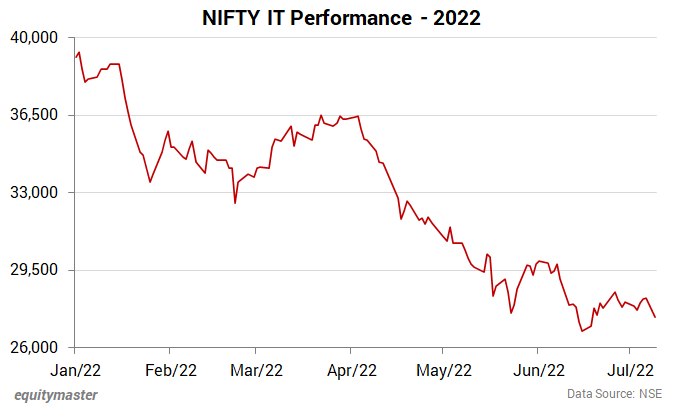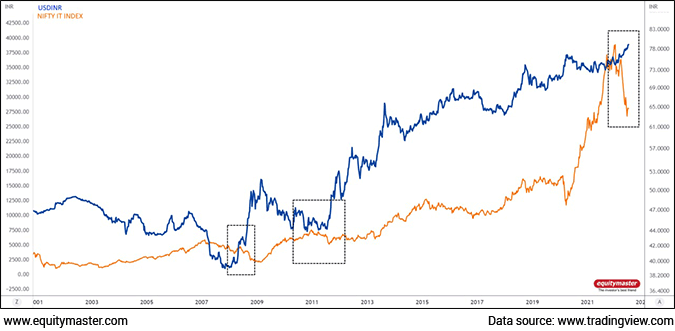India's Third Giant Leap
This Could be One of the Biggest Opportunities for Investors
- Home
- Views On News
- Jul 12, 2022 - Why IT Stocks Are Falling
Why IT Stocks Are Falling

During the pandemic and lockdowns, the IT and broader technology sectors, were in spotlight and boomed big time. This was due to the increasing importance of working from home.
However, things have changed quickly... and how!
The IT sector, one of the strongest sectors in the country, is now under pressure due to recent global crisis and fears of a recession.
So far this year, the Nasdaq Composite index, which has the big tech stocks like Amazon, Tesla, Google, among others, has slipped by more than 28%.
Indian IT stocks follow a similar trend when it comes to technology. So if Nasdaq falls overnight, Indian IT stocks usually fall the very next day.
The BSE IT index has tumbled 26% so far in 2022, similar to the Nasdaq's performance.
In the last trading session, the Nasdaq closed at 11,372.6, a fall of more than 250 points. In percentage terms, that's a fall of 2.3%, which is quite big.
Apparently, the Indian IT sector cannot escape the headwinds from a decline in Nasdaq. The BSE IT index fell today.
Let's try to understand what the probable causes are for the recent fall.
#1 Fears of a global recession
In 2022, Indian IT stocks have experienced a sharp correction, partly due to concerns about a prolonged slowdown in US IT spending.
May 2022, in particular, proved to be a bad month for IT stocks.
As the Federal Reserve ramps up its fight against decade-high inflation, a growing movement of economists predicts a global recession within the next 12 months.
At a time when the US market is experiencing a fear of recession, Indian market is unlikely to escape the headwinds.
A wave of recession is looming all over the world and among all the commodities.
For the last few weeks, global markets are experiencing intense pressure.
The IT sector has become prey to the fears of a recession.
Take a look at how the top IT sector stocks in India have reacted to this sentiment.
India's Top IT Stocks are Falling
| Company | Change in 1 month (%) | Change in 2022 (%) |
|---|---|---|
| Wipro | -8.1 | -42.8 |
| Infosys | 1.6 | -22.5 |
| Tech Mahindra | -5.7 | -42.4 |
| TCS | -3.9 | -18.2 |
#2 Attrition rate concerns still looming large
The attrition rate, also known as the churn rate, is the rate at which employees leave a company.
It's calculated by dividing the number of people who have left the company by the average number of employees over time.
Amid the pandemic, attrition in the IT sector has been steadily increasing and has now reached a new high. This scenario is said to be taking place at all of the top information technology firms.
In the final quarter of financial year 2021-22, most Indian IT companies reported an employee attrition rate of more than 20%.
Infosys reported an attrition rate of nearly 28%, while Wipro reported an attrition rate of 23.8%. Most mid-tier IT services companies had rates of up to 20%.
Recently, in its Q1 results, TCS reported a record high attrition of 19.7%.
This is bad news for other IT companies as investors see how the biggest company from the lot has performed and predict a similar possibility.
While IT firms struggle to keep attrition under control, demand from startups and GCCs (global capability centers) remains strong.
Many techies prefer GCCs (technology captives of global MNCs) and startups due to higher salaries and flexible job schedules as the chances of going abroad on on-site projects decrease.
In addition, some resignations in the technology sector were experienced due to a reluctance to resume work from offices.
To overcome this situation of high attrition rate, companies are coming with attractive strategies to retain and make their employees happy.
For example, Wipro announced to deliver a salary hike by 10% and even 15% for top performers of the company.
This exhibits, how companies are going an extra mile for their employees regardless of its effect on financial numbers.
#3 TCS Results Don't Paint a Good Picture for other IT stocks
TCS share price is falling owing to its mixed Q1 results reported last week.
The company's operating margin fell during the quarter due to an impact of annual salary increase. The management said it was a challenging quarter from a cost management perspective as it impacted their operating margin.
Now, other companies too would have done the same thing to tackle the attrition problem. This may be seen when they report their earnings in the next few weeks.
Also, TCS said that clients in Europe are more cautious on tech spends given the possibility of deeper recession and ongoing conflict in Eastern Europe, leading to delays in decision making.
IT companies usually generate majority of revenues from overseas business.
Investment Takeaway
The Nifty IT index has seen a correction of more than 30% in the year 2022.

As things stand now, IT companies may not face revenue challenges as a result of the multi-year contracts they have signed.
Multi-year contracts refers to contract of more than twelve months.
For example, Wipro signed a multi-year strategic contract with E. ON, a German company, for their digital transformation journey.
Infosys has a five-year contract from Telenet, a Belgiam-based company, for providing simplifications on their existing landscape.
HCL Tech has in a five-year contract with a German chemical company.
In this month of July 2022, many companies are going to declare their Q1 results.
We will have to see if these companies can make their investors smile.
The depreciating rupee also cannot be ruled out. The rupee has come under pressure due to Russia-Ukraine war and rising interest rates. It continued to touch new lows daily these days.
A sliding rupee is good for IT stocks as it improves their margin. IT companies earn their revenue in dollars. This translates to higher rupee earnings during times of dollar appreciation.
Here's chartist Brijesh Bhatia explaining whether a depreciating rupee can trigger the recovery in IT stocks.
- An abrupt bullish momentum in USDINR triggers an uptick in IT index which was witnessed in 2009 & 2012.
The IT index is down by 28% in H12022 while a depreciating rupee may trigger a recovery in the IT index.
On weekly chart of IT index, the bullish harami candlestick pattern is visible in mid-June indicating the sign of reversal.
US$ INR & Nifty IT Index

- A depreciating rupee may ignite the reversal for IT index.
As you seem to be interested in IT stocks, read our IT sector report.
Happy Investing.
Disclaimer: This article is for information purposes only. It is not a stock recommendation and should not be treated as such. Learn more about our recommendation services here...


Equitymaster requests your view! Post a comment on "Why IT Stocks Are Falling". Click here!
Comments are moderated by Equitymaster, in accordance with the Terms of Use, and may not appear
on this article until they have been reviewed and deemed appropriate for posting.
In the meantime, you may want to share this article with your friends!